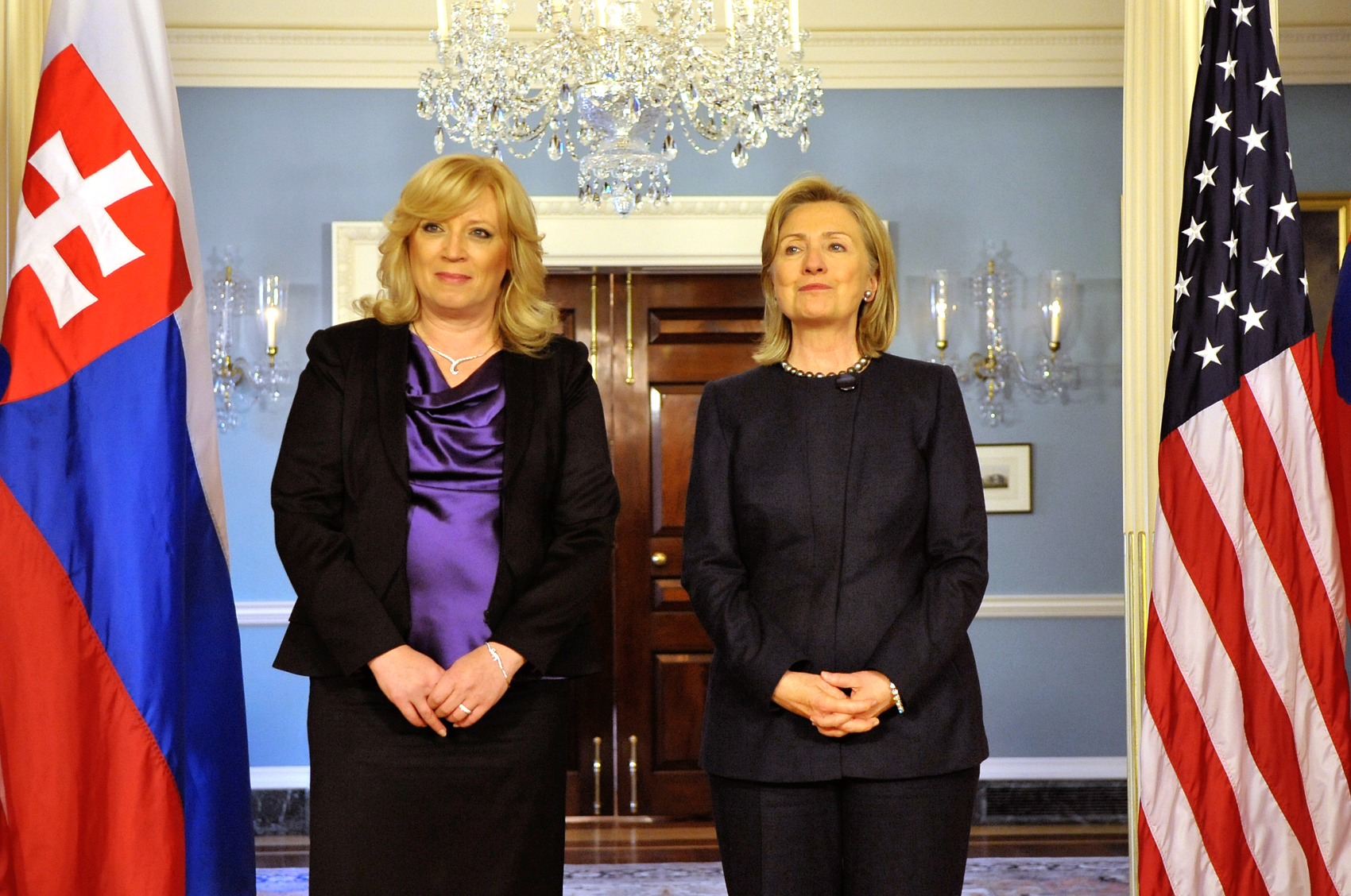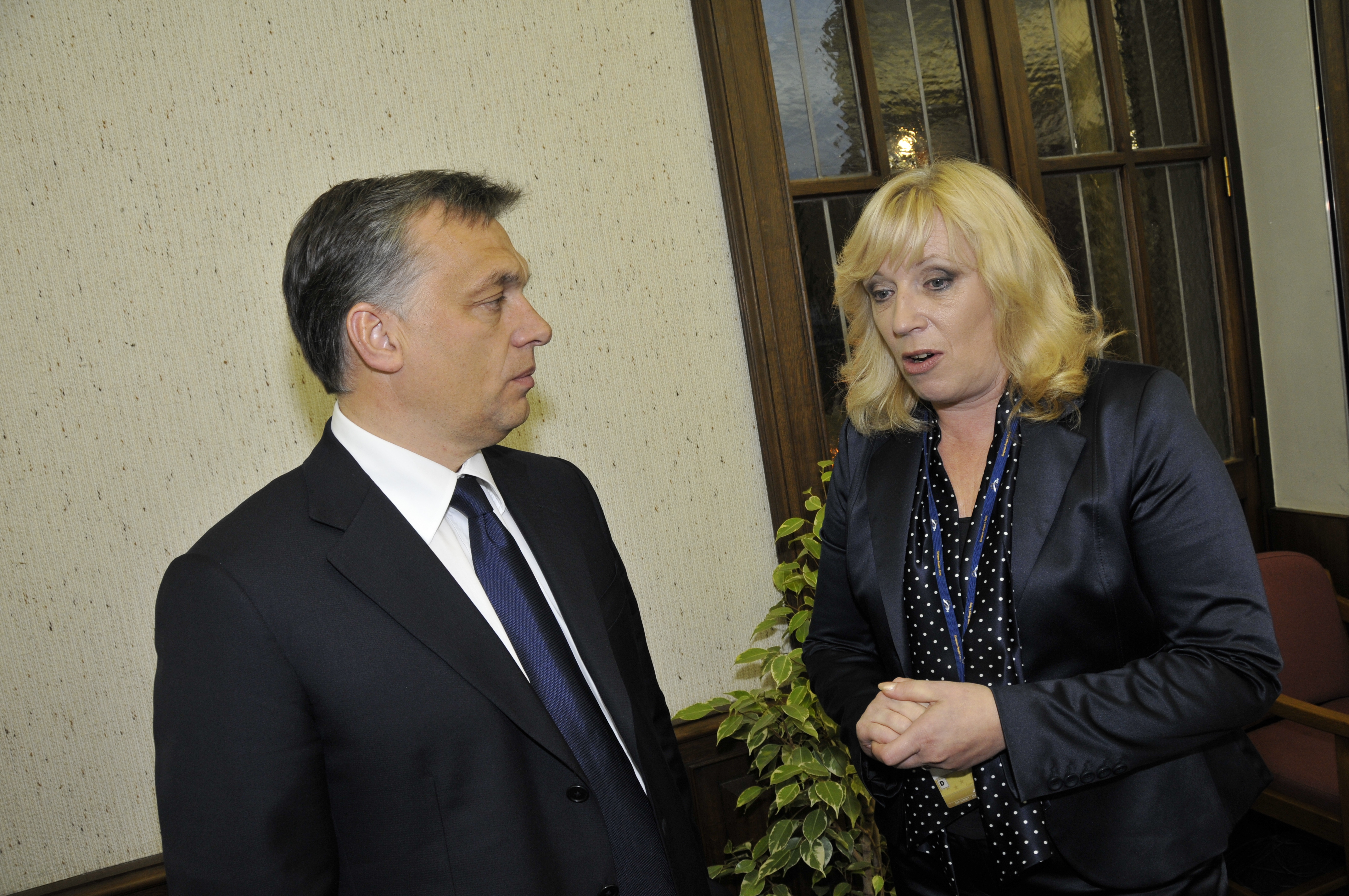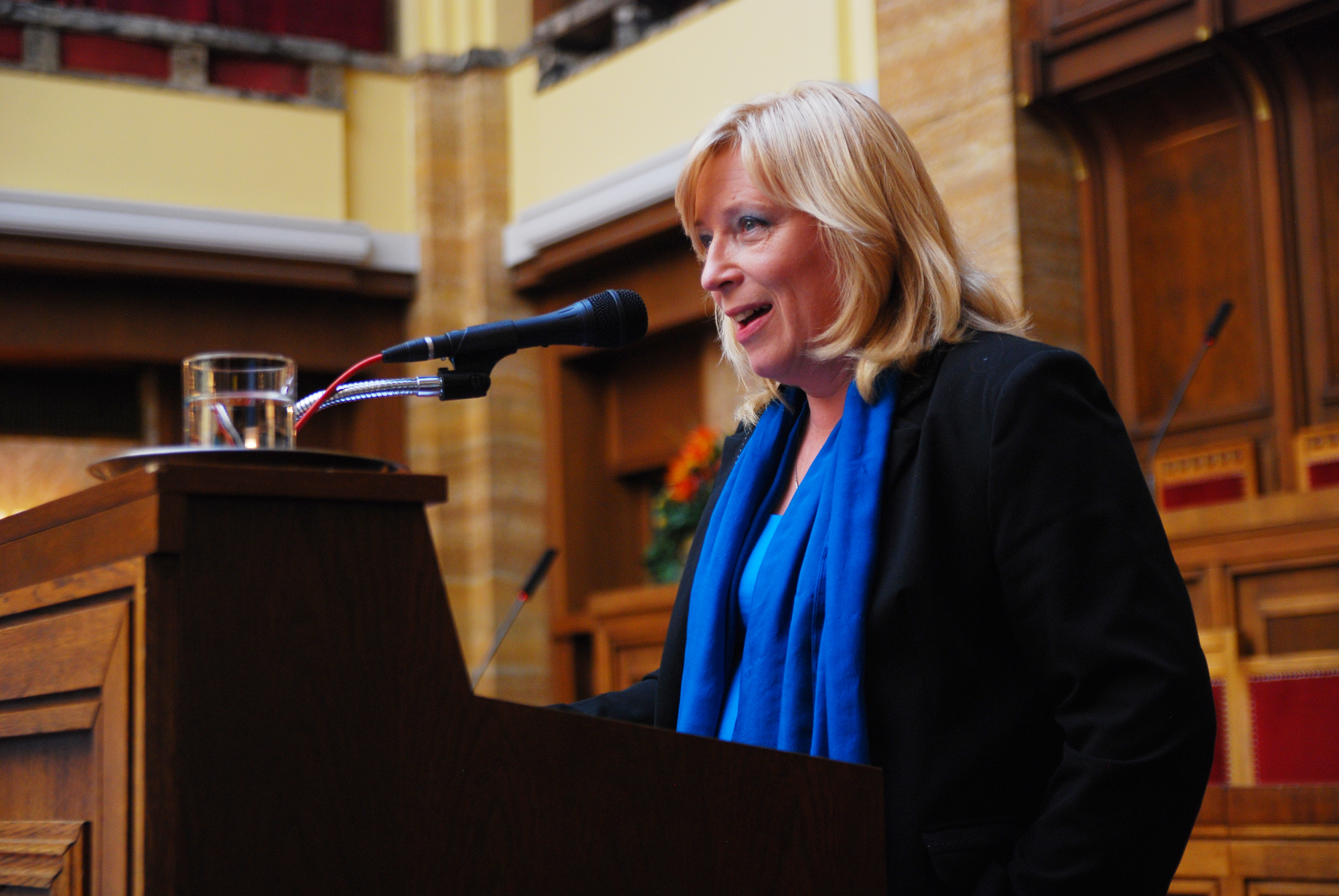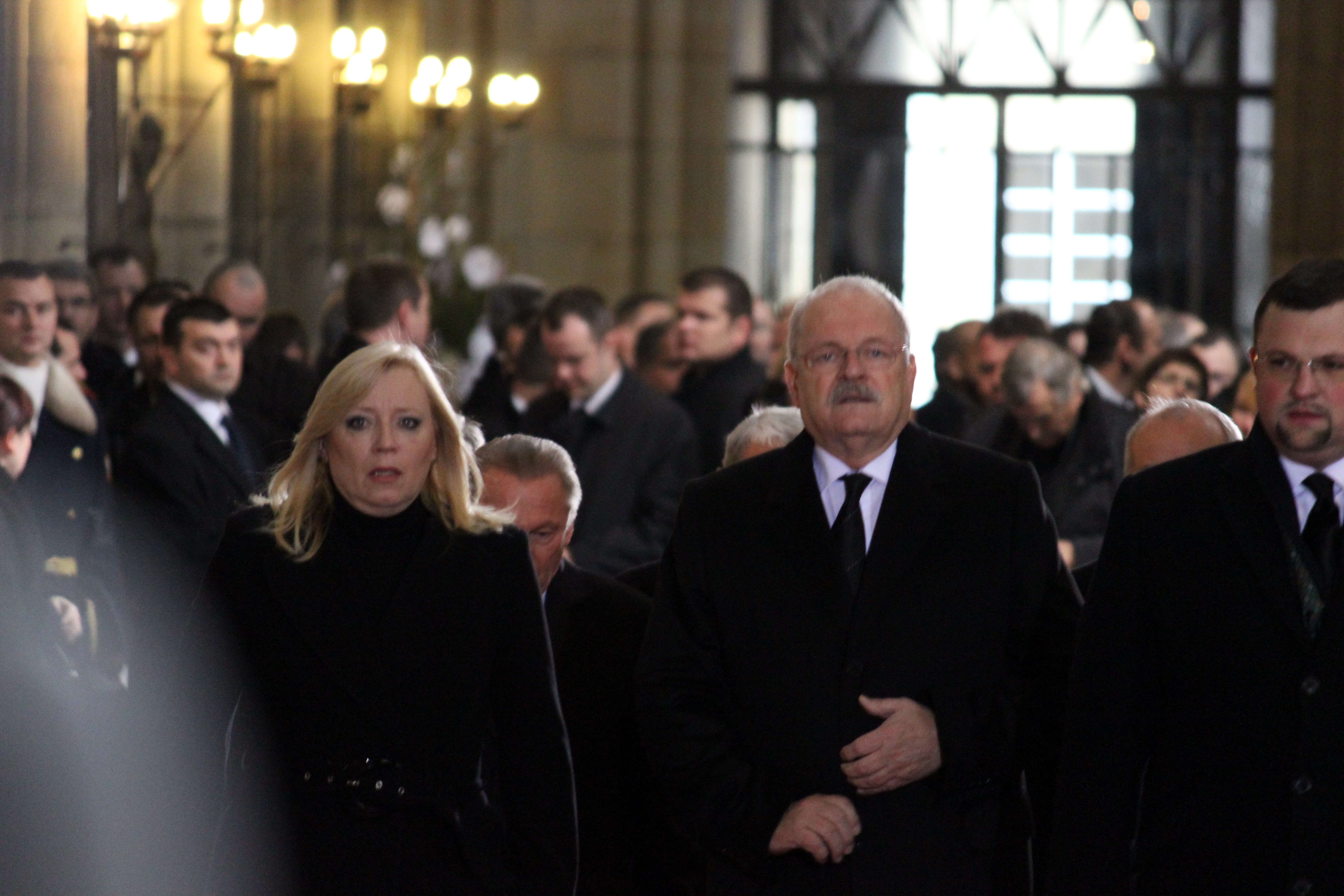1. Early Life and Background
Iveta Radičová's early life in Czechoslovakia laid the foundation for her later academic and political career, marked by her family's circumstances and her strong commitment to education.
1.1. Childhood and Education
Iveta Karafiátová was born in the Old Town of Bratislava, Czechoslovakia, on 7 December 1956, specifically on Nedbalova Street. Her father, a former journalist from Košice, worked at a printing house in Bratislava. Radičová grew up in a household with a low living standard, which she attributed to the country's communist governance and her father's inability to thrive under that system. Tragically, her older brother passed away before her birth.
Radičová described her father as strict but characterized her mother as an angelic figure. She exhibited an early aptitude for learning; when her father took her to enroll in school, the headmaster allowed her to skip kindergarten upon discovering that she could already read. Throughout her childhood, she actively practiced dance, though she ceased this pursuit at the age of sixteen. Despite being accepted into university, she was not permitted to formally graduate from secondary school, as she and her classmates collectively decided to reject the mandatory socialist theme imposed on their class project.
From 1975 to 1979, Karafiátová attended Comenius University in Bratislava, where she pursued studies in sociology. This academic path was chosen on the advice of Tón Hirner, a family friend and the brother of the sociologist Alexander Hirner. Initially, she aspired to pursue a hybrid degree combining sociology and mathematics, but this program was ultimately canceled as she was the sole applicant. During her time at the university, she met Stano Radič. The couple married in 1979 and welcomed their daughter, Eva, in 1980. Following her bachelor's degree, Iveta Radičová continued her studies at the Slovak Academy of Sciences, where she earned her PhD in sociology.
2. Academic and Early Activities
Radičová's career as a sociologist and her early engagement in civic and political movements shaped her intellectual and public identity before her formal entry into government.
2.1. Career as a Sociologist
Iveta Radičová began her professional career in 1979 as the head of the Slovak Academy of Sciences' family research team. In this role, she focused on studying how communist states, including Slovakia, could effectively implement family policy. Notably, unlike most academics in her field at the time, she chose not to join the Communist Party of Slovakia and avoided studying Marxism-Leninism. Instead, she specialized in methodology, a field that demanded less ideological conformity, allowing her to maintain a relatively open stance regarding her anti-communist beliefs.
In 1989, Radičová departed from the Slovak Academy of Sciences and spent the subsequent year at the University of Oxford, where she collaborated with Ralf Dahrendorf. Upon her return to Slovakia in 1990, she began teaching sociology and political science at Comenius University. That same year, she founded the Social Policy Analysis Center, serving as its director from 1992 until 2005. During this period, both at Comenius University and the Social Policy Analysis Center, she developed a specialization in the study of gender issues. She also assumed the role of head of the board for the Slovak branch of the Open Society Foundations. In 2005, she was appointed a full professor, making her the first woman in Slovakia to hold a professorship in sociology. Later that year, she was named head of the Slovak Academy of Sciences' Sociology Institute, a position she held until her resignation in 2007.
2.2. Velvet Revolution Participation
As the Velvet Revolution commenced in 1989, Iveta Radičová became actively involved with the Public Against Violence (VPN) movement. She served as a spokeswoman for the movement, distinguishing herself as one of the few women who played a prominent role during this pivotal period of democratic transition in Czechoslovakia. After her initial involvement with VPN, she later transitioned to become a spokeswoman for the right-wing Civic Democratic Party, though she did not hold a formal position within that party.
2.3. Early Political and Social Activities
Prior to her formal political office, Iveta Radičová's activities demonstrated her commitment to democratic values and social reform. She was a staunch opponent of the dissolution of Czechoslovakia in 1993, advocating for the preservation of the federal state. Furthermore, she consistently supported liberal democracy throughout the semi-authoritarian rule of Vladimír Mečiar during the 1990s, actively working against his political influence.
From 1993 to 1997, she served as the vice-director of the historical site Academia Istropolitana. In the 1998-1999 academic year, Radičová was a visiting fellow at New York University, participating in the prestigious Fulbright Program. Her foundational work in social policy research in Slovakia also led to her founding one of the nation's first non-governmental organizations (NGOs) in 1991, which remained active until 2005.
3. Political Career
Iveta Radičová's political career progressed through significant ministerial and parliamentary roles, culminating in her historic tenure as Slovakia's first female Prime Minister.

3.1. Entry into Parliament and Ministerial Role
In 2005, Mikuláš Dzurinda, who succeeded Vladimír Mečiar as Prime Minister as part of a democratic coalition government, appointed Iveta Radičová as the Minister of Labour, Social Affairs, and Family. Although she was not an elected politician at the time, she was chosen for this role due to her extensive expertise in social policy. This transition, however, presented challenges; Radičová found it difficult to adapt to the political environment and faced difficulties in building strong alliances with her ministerial peers or managing her subordinates within her own ministry.
Radičová left her ministerial position the following year to run in the 2006 Slovak parliamentary election for a seat in the National Council. She was successfully elected as a nonpartisan candidate affiliated with the centre-right political party, the Slovak Democratic and Christian Union - Democratic Party (SDKÚ-DS), and formally joined the party in November 2006. She was subsequently chosen as the party's deputy chair, specializing in issues related to families and welfare spending. During her parliamentary term, she also served as the deputy chair of the Committee of Social Affairs and Housing. As SDKÚ-DS was an opposition party at the time, her ability to pass legislation was limited. During this period, in 2006, she also began a three-year romantic relationship with Paralympic athlete Ján Riapoš.
3.2. 2009 Presidential Campaign
In 2009, Iveta Radičová became the opposition candidate in the 2009 Slovak presidential election. Representing the SDKÚ-DS, her candidacy received endorsements from several other right-wing parties, including the Christian Democratic Movement, the Party of the Hungarian Coalition, and the Civic Conservative Party. To secure the support of the Christian Democratic Movement, which initially disapproved of her relatively liberal stances on family and gender issues, Radičová engaged in negotiations, ultimately agreeing to issue a statement of neutrality on these subjects.
During her campaign, Radičová specifically spoke out against abortion, as voters tended to perceive her as more sympathetic to abortion rights due to her gender, making this a central point of gender-related discussion in the election. Despite her earlier assertion that being a woman might hinder her in a presidential election, she largely avoided publicly addressing this topic during her campaign. Radičová deliberately contrasted her approach with that of her opponents by maintaining a policy of civility, speaking calmly, and refusing to engage in personal attacks. However, her critics used her perceived lack of aggressiveness to suggest an inability to effectively fight for the country's interests. Her prior opposition to the dissolution of Czechoslovakia was also portrayed as a lack of loyalty to Slovak national identity. Voters expressed concerns that she was too closely aligned with the nation's significant Hungarian minority and might grant them autonomy, leading to the support of the Party of the Hungarian Coalition being detrimental to her approval outside of the Hungarian-populated southern regions of Slovakia.
In the first round of the election, Radičová secured 38.05% of the vote, totaling 713,735 votes, placing her second overall. This allowed her to advance to the second round against the incumbent president, Ivan Gašparovič, who had received the most votes. However, she ultimately lost the runoff election, garnering 44.47% of the vote (988,808 votes) compared to Gašparovič's 55.5%.
3.3. Premiership
Iveta Radičová's tenure as Prime Minister of Slovakia, from July 2010 to April 2012, was a period marked by significant challenges in economic recovery and coalition governance.

Prior to her premiership, on 21 April 2010, Radičová faced a political scandal when she cast a vote on behalf of her absent colleague, Tatiana Rosová, violating parliamentary rules. Radičová resigned from her seat two days later. Despite this, she retained her position as SDKÚ-DS's deputy leader and successfully competed against Ivan Mikloš for the top spot on the party's candidate list for the 2010 Slovak parliamentary election. Although the SDKÚ-DS did not win a plurality of the vote in the June 12 election (securing 31 seats, the second most), the incumbent Prime Minister Robert Fico of the Direction - Social Democracy party was unable to form a coalition. This opened the path for SDKÚ-DS to form a new coalition government, leading to Radičová's appointment as Prime Minister of Slovakia on 8 July 2010, making her the first woman to hold the office. Her cabinet was also notable as the first after democratization in Slovakia where all ministers had no prior membership in the former Communist Party of Czechoslovakia or the Communist Party of Slovakia.

3.3.1. Government Formation and Policies
Radičová's coalition government comprised her own SDKÚ-DS, the Christian Democratic Movement, Freedom and Solidarity, and the inter-ethnic party Most-Híd. Due to the complex political circumstances of her appointment, she was often described as an "accidental prime minister." Her position was inherently fragile, with relationships with major party figures in her government, such as Mikuláš Dzurinda as the Minister of Finance and Ivan Mikloš as the Minister of Foreign Affairs, deteriorating into opposition. The coalition itself proved unreliable, as the constituent parties frequently disagreed on major issues. Further complicating her premiership were several corruption scandals that necessitated the replacement of multiple appointees. In November 2011, when the minister of defence resigned due to such a scandal, Radičová temporarily assumed a second role as acting Minister of Defence.
The economy was a paramount concern during Radičová's term, as she took office at the tail end of the Great Recession and was tasked with leading the nation's recovery. Slovakia's financial standing was less robust compared to other European nations, grappling with a substantial deficit, high unemployment, significant national debt, low average income, a poor standard of living, and insufficient infrastructure. Despite these challenges, her government saw a notable decrease in unemployment by 0.8 percentage points. Radičová pledged that her administration would prioritize cutting state spending to reduce the budget deficit, explicitly avoiding tax increases. She stated, "We are ready to take responsibility over the country at a time when it is coping with the impact of a deep economic crisis and the irresponsible decisions of our political predecessors."
Radičová also expressed concerns that Slovakia's guarantee of 4.50 B EUR to the EU stabilization fund was excessive. While she committed not to block the approval of the scheme within the European Union, she actively sought to renegotiate her country's contribution. Additionally, her government worked to improve strained relations with Hungary, which had been affected by laws negatively impacting Slovakia's Hungarian population. To combat government corruption, Radičová spearheaded efforts by establishing an open government initiative. This included a requirement that all public procurement contracts be made publicly available online to promote transparency. However, her administration also faced its own share of corruption scandals, most notably the Gorilla scandal, which revealed illicit meetings between SDKÚ-DS leadership and other officials with various businesses. This scandal significantly eroded public trust in her government and negatively impacted the party's performance in the 2012 Slovak parliamentary election. By the end of her term, Radičová acknowledged that she was unable to enact most of her policy objectives, largely attributing this to her short period as Prime Minister and the widespread unrest and governance difficulties across the European Union caused by the Great Recession.

3.3.2. Coalition Collapse and Early Elections
Radičová's coalition government ultimately collapsed on 11 October 2011, during a vote concerning the European Financial Stability Facility (EFSF). A key partner in her coalition, the Freedom and Solidarity (SaS) party, refused to support the EFSF ratification. Radičová explicitly linked the EFSF vote to a motion of no confidence in her government, insisting that a vote against the fund would be tantamount to rejecting her administration. However, this tactic failed to sway them, and the vote consequently led to the downfall of her government. Following this, Radičová and the SDKÚ-DS issued a statement defending their decision, asserting that European integration was of greater importance than the survival of the existing government. In response to the political crisis, Radičová's government agreed to hold early parliamentary elections on 11 March 2012, a condition sought by the opposition. A re-vote on the EFSF was subsequently held on 13 October 2011, and the measure was passed.
4. Post-Premiership
After concluding her term as Prime Minister, Iveta Radičová transitioned back to academia while maintaining a notable public presence.
4.1. Return to Academia and Writing
Upon leaving politics, Iveta Radičová was succeeded by her predecessor, Robert Fico. On 3 May 2012, she formally renounced her membership with the SDKÚ-DS, including her position as deputy party leader, and declared her retirement from active politics. She subsequently returned to Comenius University in Bratislava, where she resumed her teaching career as a lecturer. In 2017, her academic contributions were further recognized when she was chosen as the Dean of the Faculty of Mass Media at the Pan-European University.
In 2013, Radičová published Krajina hrubých čiar (English: Country of Full Stops), a reflective book detailing her experiences during her time as Prime Minister. This work provided insights into the challenges and decisions made during her leadership.
4.2. Public Perception and Awards
Even after departing from the prime ministership, Iveta Radičová continued to hold a significant and positive public standing in Slovakia. A 2014 poll conducted by Polis Slovakia indicated that 23.2% of respondents named Radičová as one of the country's best recent politicians, placing her second only to Robert Fico. Notably, her name did not appear on the list of the twelve least valuable politicians in the same poll, reflecting a generally favorable public view. In 2017, she was honored with a Women Political Leaders award, recognizing her influence as a female leader. Furthermore, a 2018 poll by Focus found that she was the most popular choice for President of Slovakia, garnering 13.9% support.
5. Personal Life
Iveta Radičová's personal life has seen significant developments alongside her professional and political endeavors. She married Stano Radič in 1979, and together they had a daughter named Eva in 1980. Sadly, her husband passed away from a heart attack in 2005. Following this, in 2006, Radičová began a romantic relationship with Paralympic athlete Ján Riapoš, which lasted for three years. In 2012, after her premiership, she entered into a relationship with Marián Balázs, who had previously served as the head of her advisory team.
6. Assessment and Impact
Iveta Radičová's political career and personal contributions have left a notable impact on Slovak society and its democratic development, characterized by her pioneering leadership and dedication to social progress, while also navigating significant political challenges.
6.1. Positive Contributions
Iveta Radičová's career is marked by several significant positive contributions to Slovak society and democratic development. Her most prominent achievement was becoming Slovakia's first and, to date, only female Prime Minister. This pioneering role not only shattered a gender barrier but also served as an inspiration for greater female participation in leadership across the country. As a sociologist specializing in family policy and gender issues, Radičová brought a strong academic foundation and a focus on social welfare to her political roles. Her early work at the Slovak Academy of Sciences and her founding of the Social Policy Analysis Center demonstrated her commitment to evidence-based policy-making and addressing societal needs.
Throughout her public life, Radičová was a vocal advocate for liberal democracy and human rights. Her opposition to the dissolution of Czechoslovakia and her stance against the semi-authoritarian rule of Vladimír Mečiar highlighted her dedication to democratic values during critical periods of post-communist transition. As Prime Minister, she championed transparency and anti-corruption measures, notably establishing an open government initiative and requiring public procurement contracts to be accessible online. This commitment aimed to foster greater accountability and public trust in governance. Despite the challenges of the Great Recession, her administration made strides in economic management, including a reduction in unemployment. Her efforts to improve relations with Hungary also contributed to regional stability and cooperation. Radičová's calm and civil approach in politics, even when facing strong criticism, showcased a leadership style that prioritized constructive dialogue over divisive rhetoric, contributing to a more mature political discourse.
6.2. Criticisms and Controversies
Despite her positive contributions, Iveta Radičová's political career, particularly her premiership, faced notable criticisms and controversies. A primary challenge was the inherent fragility of her four-party coalition government, which was frequently plagued by internal disagreements and a lack of unified vision on major policy issues. This internal disunity, coupled with strained relationships with key figures within her own party, often hampered her ability to enact her policy agenda effectively. Critics pointed to her perceived lack of aggressiveness in political battles, suggesting it indicated an inability to strongly defend the country's interests, particularly during her presidential campaign. Her earlier opposition to the dissolution of Czechoslovakia was also politically weaponized by opponents, portraying her as disloyal to the Slovak national cause and overly aligned with the Hungarian minority.
During her tenure as Prime Minister, her government, despite its anti-corruption pledges, was embroiled in several high-profile scandals, most notably the Gorilla scandal. This discovery of illicit meetings between SDKÚ-DS leadership and businesses severely eroded public trust in her administration and significantly impacted her party's standing in subsequent elections. Her decision to link the European Financial Stability Facility (EFSF) vote to a motion of no confidence ultimately led to the collapse of her government, a move seen by some as a miscalculation in coalition management. Furthermore, the short duration of her premiership and the overarching economic challenges of the Great Recession limited her ability to fully implement her policy objectives, leading to criticisms that her government achieved fewer substantive reforms than initially intended. Her decisive electoral defeat in the 2012 snap elections, resulting in a significant loss of seats for her party, underscored the public's dissatisfaction with the political instability and challenges faced during her leadership.